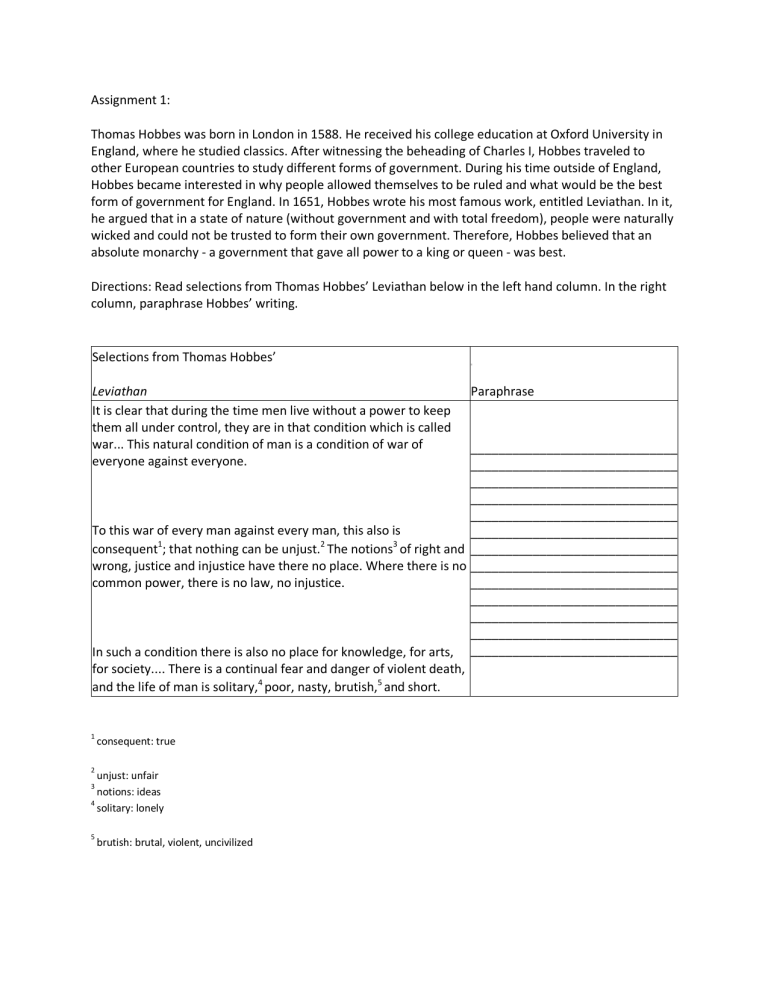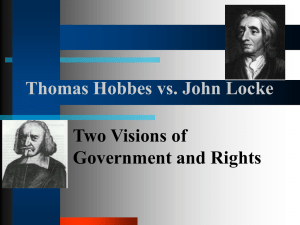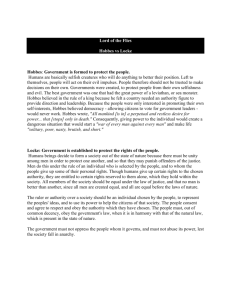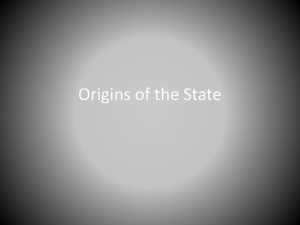
Assignment 1: Thomas Hobbes was born in London in 1588. He received his college education at Oxford University in England, where he studied classics. After witnessing the beheading of Charles I, Hobbes traveled to other European countries to study different forms of government. During his time outside of England, Hobbes became interested in why people allowed themselves to be ruled and what would be the best form of government for England. In 1651, Hobbes wrote his most famous work, entitled Leviathan. In it, he argued that in a state of nature (without government and with total freedom), people were naturally wicked and could not be trusted to form their own government. Therefore, Hobbes believed that an absolute monarchy - a government that gave all power to a king or queen - was best. Directions: Read selections from Thomas Hobbes’ Leviathan below in the left hand column. In the right column, paraphrase Hobbes’ writing. Selections from Thomas Hobbes’ Leviathan It is clear that during the time men live without a power to keep them all under control, they are in that condition which is called war... This natural condition of man is a condition of war of everyone against everyone. Paraphrase ______________________________ ______________________________ ______________________________ ______________________________ ______________________________ To this war of every man against every man, this also is ______________________________ 1 2 3 consequent ; that nothing can be unjust. The notions of right and ______________________________ wrong, justice and injustice have there no place. Where there is no ______________________________ common power, there is no law, no injustice. ______________________________ ______________________________ ______________________________ ______________________________ In such a condition there is also no place for knowledge, for arts, ______________________________ for society.... There is a continual fear and danger of violent death, and the life of man is solitary,4 poor, nasty, brutish,5 and short. 1 consequent: true 2 unjust: unfair notions: ideas 4 solitary: lonely 3 5 brutish: brutal, violent, uncivilized The only way to create a power that may be able to defend men from their own evil nature is for them to confer6 all their power and strength upon one Man, that may reduce all their wills7 into one. By giving all strength onto this one man, that by terror thereof, he is enabled to establish Peace at home, and defense against their enemies abroad. ... In this one man should lay all the legislative8 power... First, it is important to note that law in general is not advice, but a command; nor a command of any man to any man, but only of him whose command is addressed to one formerly obliged9 to obey him. Secondly, the sovereign10 is not subject to the law. For having power to make and repeal11 laws, he may, when he pleases, free himself by repealing those laws that trouble him, and making new ones... Laws should have clear rewards to encourage virtue12 in citizens, but more importantly, clear punishments to discourage the evil qualities that man is prone13 to. For it is only out of a fear of some evil consequence that men are compelled14 to act certain ways. 6 7 ______________________________ ______________________________ ______________________________ ______________________________ ______________________________ ______________________________ ______________________________ ______________________________ ______________________________ ______________________________ ______________________________ ______________________________ ______________________________ ______________________________ ______________________________ ______________________________ ______________________________ ______________________________ ______________________________ ______________________________ ______________________________ ______________________________ ______________________________ ______________________________ ______________________________ confer: grant, give will: ability to act independent, do what you want, “free will” 8 legislative: law writing obliged: obligated, mandatory, has to 10 sovereign: ruler, person in charge, person with power 11 repeal: get rid of, undo 12 virtue: good qualities 13 prone: having a tendency to do something 14 compelled: forced to 9 Assignment 2: John Locke was born in 1632 in England. Like Thomas Hobbes, John Locke lived during tumultuous times in England’s history. In his adult life, Locke witnessed the Glorious Revolution of 1688, the writing of the English Bill of Rights, and the placing of William and Mary on the throne of England. During this time of upheaval, Locke decided to lay out a theory for determining when governments are just or unjust. His most famous works on government were the Two Treatises of Government and On Civil Government. In it, he argues that in a state of nature, people are good and can be trusted to form their own government. Since the people form the government, the government must have the consent of the governed, or the permission of the people to rule over them. He also argues that people enter into society and form a government in order to protect the natural rights that all people are born with. Most importantly, he argued that when a government is unjust, it has broken the social contract and people have a responsibility to overthrow it and start a new one. This idea had a huge influence in revolutions in the 18th and 19th centuries. Part 1 Directions: Read selections from John Locke’s On Civil Government and Two Treatises of Government below in the left hand column. In the right column, paraphrase Locke’s writing. Selections from John Locke’s On Civil Government and Two Treatises of Government Paraphrase 15 To understand political power aright , we must consider what state16 all men are naturally in, and that is, a state of perfect freedom to order their actions and do with their possessions what they think fit, and without depending upon the will17 of any other man. . . . ______________________________ ______________________________ ______________________________ ______________________________ ______________________________ ______________________________ 18 The state of nature has a law of nature to govern it, which ______________________________ obliges19 every one: that being all equal and independent, no one ______________________________ ought to20 harm another in his life, health, liberty, or possessions.. ______________________________ ______________________________ 21 This is because I have reason to conclude , that he who would get ______________________________ ______________________________ me into his power without my consent,22 would use me as he ______________________________ pleased when he 15 aright: correctly state: condition 17 18 will: the power to do something, the ability to act independently govern: rule 19 obliges: obligates, makes you follow 20 ought to: should 21 conclude: believe 22 consent: permission 16 had got me there, and destroy me too when he had a fancy23 to it... This is because nobody can desire to have me in his absolute power, unless it be to compel24 me by force to that which is ______________________________ ______________________________ ______________________________ ______________________________ ______________________________ ______________________________ ______________________________ against the right of my freedom, i.e. make me a slave. In this case, ______________________________ it is my right to resist such attempts. ______________________________ ______________________________ 25 ______________________________ The reason why men enter into society, is the preservation of 26 their property; and the end why they choose and give power to a ______________________________ ______________________________ government, is, that there may be laws made, and rules set, as guards and fences to the natural rights of all the members of the ______________________________ ______________________________ society, to limit the power, and moderate27 the dominion28, of ______________________________ every part and member of the society. ______________________________ ______________________________ ...But whensoever the government puts into the hands of any ______________________________ other an absolute power over the lives, liberties, and estates29 of ______________________________ 30 31 32 the people, by this breach of trust they forfeit the consent of ______________________________ the people to rule over them... ______________________________ ______________________________ The people then have a right to resume their original liberty, and ______________________________ by the overthrowing and establishment of a new government, ______________________________ provide for their own safety and security. 23 fancy: desire 25 compel: push, force, oblige preservation: protection 26 end: reason 27 moderate: limit 28 dominion: power 29 estates: property 30 breach: violation 31 forfeit: give up, lose 32 consent: permission 24





